ARLINGTON — Arlington Pharmacy General Manager Cory Duskin has inspired a piece of legislation, sponsored by state Rep. Kirk Pearson, that they both hope will help provide less expensive and more attentive health care for pharmacy patients throughout the state.
“I’m always getting different ideas from my constituents, but this one hit close to home,” Pearson said. “When my father passed away, I remembered how wonderful his local pharmacy was in going above and beyond the call of duty for him. Local pharmacies aren’t just places to buy drugs. They develop real relationships with their customers.”
Many people have never heard of Pharmacy Benefit Managers, but according to Duskin and Pearson, the PBMs’ decisions can impact the quality of prescription drugs and pharmacy services that pharmacy customers receive, as well as the prices they pay for them.
Pearson explained that PBMs manage prescription drug benefits for a variety of health plans, and receive rebates and discounts from pharmaceutical manufacturers for promoting their products, which favors more expensive brand drugs over cost-effective generics.
Both Pearson and Duskin expressed concerns about the fact that PBMs are the only health care profession that’s unregulated within Washington state, and pointed to the 23 other states that have adopted legislation similar to House Bill 2303, which was introduced on the floor Jan. 11 with Republican Pearson as its primary sponsor and two Democratic representatives cosponsoring it. Duskin took particular exception to the number of PBMs that drive traffic toward “preferred” pharmacies and their own mail-order pharmacies.
“The Department of Health checks my store’s temperature, refrigeration, water, even our name tags,” Duskin said. “With PBMs’ mail-order pharmacies, they can send medication that needs to be refrigerated through the mail, that can sit on people’s doorsteps for weeks if they’re on vacation, and we all pay for that waste.”
Duskin warned that PBMs can require different medications than doctors recommend in prescriptions, since health care plans provided by employers do their business through PBMs. With reimbursements to health care providers going down while premiums go up, Duskin called for oversight to ensure that PBMs aren’t pocketing the difference.
“We need transparency, but we don’t need to create any new agencies,” Duskin said. “This is not growing government or increasing government spending. All the enforcement procedures are already on the books.”
Duskin doesn’t object to competition from other pharmacies, but he doesn’t believe the free market is served by having PBMs tell insurers with which pharmacies their customers should be doing business.
“The more disjointed the relationships between patients, physicians and pharmacies become, the more it impacts the quality of patient care,” Duskin said. “You wouldn’t just deal with your doctor through Skype. Local pharmacies, that patients choose, have the patients’ files and know to check the interactions of their medications. If pharmacies can’t keep track of the patients’ total health care picture, they become just dispensaries.”
“We don’t want to eliminate PBMs,” said Pearson, who added that the state Senate has a companion bill to House Bill 2303, which has also received bipartisan sponsorship. “This legislation simply seeks to create a level playing field. As much as I deal with public safety issues, I wouldn’t be doing this if I didn’t think it was an important piece of legislation. I can’t tell you the prices will go down immediately, but it should make the market more fair and afford people more choices.”







